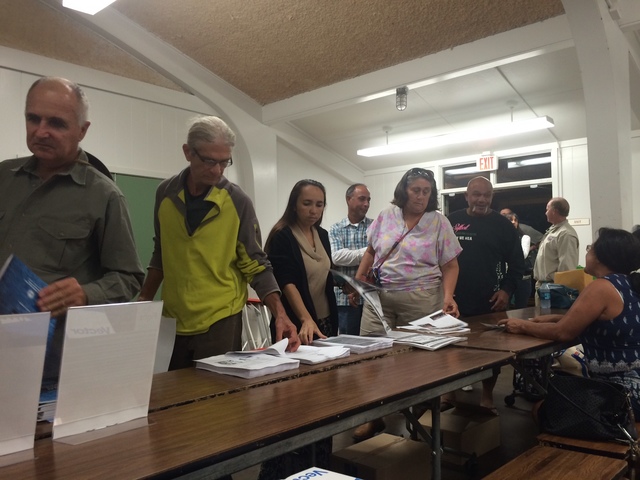KEALAKEKUA — Honaunau resident Elizabeth Kilpatrick knows several housekeepers who serve the Hookena area and have come down with dengue fever, and she’s worried for her own health. ADVERTISING KEALAKEKUA — Honaunau resident Elizabeth Kilpatrick knows several housekeepers who serve
KEALAKEKUA — Honaunau resident Elizabeth Kilpatrick knows several housekeepers who serve the Hookena area and have come down with dengue fever, and she’s worried for her own health.
“I’m 72. Of course I’m concerned for my own and my husband’s safety,” said the Middle Keei Road resident, attending an informational session on the outbreak at Konawaena High School. “I’m just trying to be super careful, trying to stay in.”
Frustrations getting the tests quickly, language barriers to spreading the word and store shelves bare of repellent were among the frustrations to surface among the group of about 175 people on Thursday evening.
For Captain Cook resident Caroline Smith, it’s what she doesn’t know about dengue that worries her. She’s concerned about the fever being bad for the eyes and bones, but doesn’t know for sure what the risk is.
“I want a map of where people have had it, to know how long it’s contagious,” she said.
On Thursday, the number of confirmed cases rose one to 34.
Fears of dengue’s spread prompted the cancellation of the Boy Scout and Webelos Scout Camporee, which had been slated for today and Saturday in Captain Cook. The event will be rescheduled when the risk of the disease is minimized, said Terry Terada, scoutmaster for Troop 15, in an email to the newspaper.
One Konawaena School Road resident who wanted to be identified only as Billy said Department of Health employees were around his property recently giving advise on ways to get rid of standing water, and that he believed there were a couple of dengue cases on his road.
“We’re really concerned,” he said. “We’ve done as much as we can with our catchment tank.”
“This can happen again,” he said. “Another infected person could come to the state, and on and on. Maybe the state needs to learn from this, and put measures in place in case it happens again … We need to be ready, not behind.”
County and state employees leading the meeting gave ways to recognize and combat the disease, kill mosquitoes and find further information. But more needs to be done to get the word out across language barriers, said Angela Dean of Comunidad Latina de Hawaii.
“You’re only reaching a small demographic,” she said. “There are 5,000 Latinos on this island.”
Lorrin Pang, Maui’s district health officer, who has been aiding the effort here since last week, said the Department of Health will send interpreters if the Latinos get together in a group.
“If we gotta go to a mobile team, we’ll go to a mobile team,” Pang said. “This is how we got to handle this.”
The coffee pickers and yard workers who circulate extensively in the community are a top concern, Pang said. He is also trying to reach out to pot growers.
“We will convince them slowly that they are not going to be harrassed; we are only looking for dengue,” Pang said.
Pang said that spraying at Hookena has helped knocked down adult mosquito populations. Only one resident didn’t allow spray, saying he was using his own natural version, he said.
Mayor Billy Kenoi said people who think they may have the disease can get preliminary screening from the paramedics at their local fire station.
“Let your family, coworkers, community know,” said Kenoi. “We can’t do it unless the community is our partners.”
Maui ran out of insect repellent for six months during the 2001 outbreak. Longs Drugs is donating $20,000 worth of repellent to help replenish depleted stocks here, Kenoi said. KTA Super Stores has another 350 cases of repellent set to arrive, Civil Defense Chief Darryl Oliveira said.
“Retailers are trying to expedite shipments, to speed it up,” said Oliveira.
Kilpatrick said she had already told one potential visitor not to come to the island.
Asked if that was the course people should take, Kenoi said he believes the authorities are on top of the disease and will eradicate it with the public’s help.
“I don’t want to raise an alarm level to where people are afraid they shouldn’t come to Hawaii Island,” Kenoi said.



